WMG News
WMG inspires young engineers at Engineering Industry Day
On Tuesday 25th April, the Outreach Team at WMG, University of Warwick hosted an Engineering Industry Day.
The Team welcomed 200, year 9 and 10, students who were identified by their teachers as students, from groups under-represented in engineering and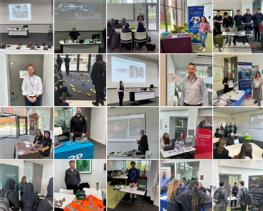 STEM careers, with an interest and a potential to do well in those subjects.
STEM careers, with an interest and a potential to do well in those subjects.
The students came from schools across the region including Eden Girls School Coventry; WMG Academy for Young Engineers in Coventry and Solihull; Colmers School and Sixth Form College; Nicholas Chamberlaine School; Lyndon School; Harris Church of England Academy; Barr’s Hill School and Community College; and KEVI Northfield School for Girls.
The group was welcomed by Professor David Greenwood, the CEO of the High Value Manufacturing Catapult and Director for Industrial Engagement at WMG, before being taken on a tour of the STEM facilities on campus.
Along with their teachers, they met academics and students, and heard about the research being carried out by the High Value Manufacturing Catapult; WMG and the School of Engineering. WMG Technical Services and the apprentices demonstrated their skills, and the Student Project teams - Warwick Racing and Warwick Mobile Robotics - showcased their work and shared their experience of studying engineering.
Participants also met with local companies including Jaguar Land Rover; Tata Motors; Aston Martin; National Grid ESO; Balfour Beatty; Wates; Willmott Dixon; National Grid; Tarmac and 3P Innovation, who provided them with advice and guidance about the skills and knowledge required to become an engineer.
They also received information about a range of support available from the Degree Apprenticeship Team; Student Funding; the Warwick Scholars Access Programme; the Sutton Trust Pathways to Engineering; the Royal Academy of Engineering’s Educational Programme and the Engineering Development Trust Programme.
WMG’s Outreach Project Officer, Marie Diebolt, who organised the event, explained: “With these types of events, and across our outreach activities, we work with our partners to close the engineering skills gap and inspire young people to pursue careers in STEM. We purposely timed the event to coincide with students selecting their GCSE subjects to enable them to make an informed choice and inspire them to consider a range of careers in engineering.”
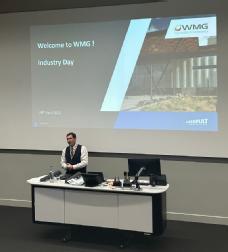 Professor David Greenwood added: “We know that the UK manufacturing sector has a big skills gap – which WMG is keen to fill. Events like these help to shine a spotlight on the exciting career prospects in manufacturing – thanks to advances in digitalisation, automation and sustainability. The opportunity to speak to potential future engineers was a privilege, and the event was a great success.”
Professor David Greenwood added: “We know that the UK manufacturing sector has a big skills gap – which WMG is keen to fill. Events like these help to shine a spotlight on the exciting career prospects in manufacturing – thanks to advances in digitalisation, automation and sustainability. The opportunity to speak to potential future engineers was a privilege, and the event was a great success.”
Find out more about WMG’s Outreach programme here: Public engagement and Outreach (warwick.ac.uk)
WMG announces new partnership with global engineering company
WMG, at the University of Warwick, has announced a new two year research partnership focusing on sustainable high-performance sealing materials.
Researchers at WMG’s Link opens in a new windowInternational Institute for Nanocomposites Manufacturing (IINM), led by Dr Chaoying Wan, will be working with experts at James Walker to develop the next generation of sealing compounds which will be compliant with future per- and poly- fluoroAlkyl substances (PFAS) regulations.
In February 2023, the European Chemicals Agency announced a proposal for the European Economic Area that will effectively lead to a ban on all PFAS materials, due to their persistence in the environment.
This research project will use high quantity techniques to develop and identify novel elastomer compounds that comply with proposed PFAS regulations, for use in critical industrial applications drawing on WMG’s expertise in elastomer and polymer technology.
The new technologies developed will have a high impact on a wide range of industries from transportation, oil/gas, semiconductor to hydrogen storage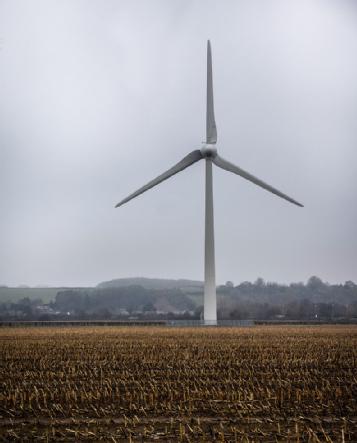 and wind turbines.
and wind turbines.
Conventional high performance sealing compounds rely on PFAS, as these materials are resistant to extremes of temperature and aggressive chemicals. PFAS are essential to the semi-conductor, aerospace, petrochemical, defence and nuclear industries for example, and there are currently no suitable replacement materials available. Alternative sealing materials are urgently needed to substitute PFAS.
Dr Mike Eason, Technical and Quality Director at James Walker commented: "Industrial dependence on PFAS elastomers is a global issue with supply chain impact already seen. I am delighted that we will work with Dr Wan and her team to identify and develop materials which will help industry be compliant with the proposed regulations. This partnership will accelerate James Walker’s development of seal materials for critical industry. WMG has small scale, advanced, mixing capability, with knowhow regarding nanofillers and polymer science that will allow James Walker to rapidly design, manufacture and screen bench-scale test formulations.
“I believe the combination of James Walker’s history and expertise in critical industrial sealing together with WMG’s state of the art capabilities will enable rapid development and commercialisation of materials. James Walker is committed to developing solutions to the PFAS regulations faced by global industry."
Dr Chaoying WanLink opens in a new window, Reader of Functional Polymers and Nanocomposites at WMG, University of Warwick explains: "Collaborating with James Walker to develop alternatives for PFAS seals is an important and exciting opportunity. Our elastomer research facility is supported by High Value Manufacturing Catapult CentreLink opens in a new window (HVMC), equipped with the latest technology, including a rubber process analyser (RPA) with wide temperature range - it is the only one in the UK, and one of only a few in the world with the capability to simulate dynamic elastomer performance at very low temperature.
“This function is extremely useful to compare differences in formulation design for applications such as high pressure or low temperature sealing. I am very much looking forward to working with the James Walker team on the development of new material options for high performance sealing applications and advancing our knowledge of polymer formulation and performance."
Find out more about WMG’s Nanocomposites research here: Nanocomposites (warwick.ac.uk)
WMG celebrates a decade of Engineering Masterclasses
The Outreach Team, at WMG at the University of Warwick, is proud to have completed a decade of Royal Institution Engineering Masterclasses.
Over the past 10 years staff and students, from WMG, have supported 250 pupils from 45 schools across Warwickshire and the West Midlands. The Masterclasses have opened the eyes of young people to the excitement and value of engineering and, have in turn, inspired the next generation of scientists, mathematicians and engineers.
A special celebration event was held to mark the occasion with 2023 masterclass students and their families and teachers. At the event, University of Warwick alumna and award-winning engineer, Yewande Akinola delivered a key note before presenting certificates in a mini graduation ceremony.
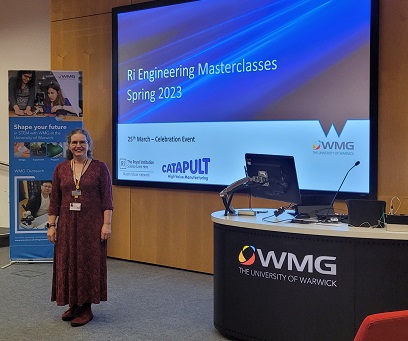 Professor Margaret Low, WMG’s Director of Outreach and Widening Participation said: “WMG has supported the Ri with the masterclasses, since 2013, with workshops and activities that put our cutting-edge engineering research into context for young people. We even found a way to deliver the activities online during the pandemic.
Professor Margaret Low, WMG’s Director of Outreach and Widening Participation said: “WMG has supported the Ri with the masterclasses, since 2013, with workshops and activities that put our cutting-edge engineering research into context for young people. We even found a way to deliver the activities online during the pandemic.
“These experiences allow students to see how their school learning applies to complicated and world-changing technologies. Through our outreach programmes we hope to inspire young people to pursue careers in STEM, widen participation in higher education and make the STEM workforce more diverse.”
Mujthaba Ahtamad (Mosh), Senior Teaching Fellow at WMG, who worked alongside Professor Margaret Low on some of the original masterclass sessions, said: “With Margaret’s enthusiasm and motivation, she really brought everything together, including inspiring the teaching team. It was really evident that the attendees were very excited to attend the Masterclasses, (perhaps more so than attending school!).”
Dr Phil Jemmett, Widening Participation Co-ordinator at WMG added: “The Royal Institution is a prestigious organisation with a long history of being at the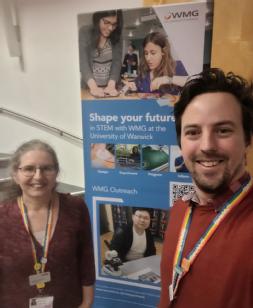 forefront of teaching science. Partnerships between universities in the local community, and the fact that these famous, royal-chartered groups are housed only a stone’s throw from Buckingham Palace, adds so much value to the student experience.
forefront of teaching science. Partnerships between universities in the local community, and the fact that these famous, royal-chartered groups are housed only a stone’s throw from Buckingham Palace, adds so much value to the student experience.
“This is not just an extra lesson that happens to be on a Saturday, this is an experience of just how far these students can go with their engineering talents. We hope that the students felt every bit of the prestige of both WMG and the Royal Institution.
“We would also like to thank the High Value Manufacturing Catapult who have supported these activities since 2019.”
Rachel Dorris, Clothworkers’ Fellow of Mathematics at the Royal Institution, said: “On behalf of the Royal Institution and the Masterclass team, I would like to congratulate you for successfully shepherding the Engineering Masterclasses at WMG to its 10th anniversary.
“We appreciate your hard work as an Ri collaborator - inspiring future generations within your community in the world of engineering.”
Find out more about WMG’s Outreach Programme here: Public engagement and Outreach (warwick.ac.uk)
Pushing the limits of battery research with nickel-rich chemistries
New research has shown that understanding how oxygen participates in energy storage is critical for developing higher energy density batteries, in a new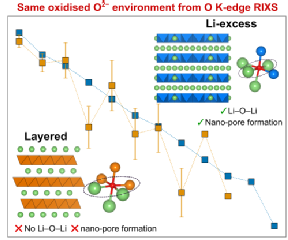 paper published by experts at WMG, at the University of Warwick.
paper published by experts at WMG, at the University of Warwick.
Using advanced X-ray techniques, researchers at WMG, together with the Faraday Institution's FutureCat consortium, have obtained new insights into the oxygen redox activity in conventional ni-rich cathodes, which will help to deliver improved electric vehicle performance.
Range anxiety is a key concern of many potential EV buyers, but range is steadily improving as battery technology and research evolves. The Faraday Institution’s Next Generation Lithium-Ion Cathode Materials project, FutureCat, aims to develop understanding of existing and newly discovered cathode chemistries to deliver improved EV performance, whilst considering sustainability.
Professor Louis Piper, from WMG at the University of Warwick, who led the research explained: “Transitioning to electrification requires integrating advanced materials science into battery processing to develop cheaper, safer, faster and better batteries, which is the focus of our research.”
The battery field is moving to increasing nickel contents in cathodes to meet the Government’s stringent EV 2030+ targets. These roadmaps assume successful strategies in material development to allow cathodes like W-LNO to operate at high voltages without degrading. This work provides the platform towards realising that goal by better understand the redox mechanisms (i.e., the reactions that enable charging/discharging the battery) at high voltage operation.
The study employed advanced x-ray characterisation techniques at the Diamond Light Source in Oxford and at WMG. The team at WMG utilised novel in-house x-ray absorption spectroscopy which enabled researchers to look at the electrode redox process of the battery cathodes after careful disassembly. Researchers were surprised to find that the oxidised oxygen species had the same characteristics as another group of Li-ion battery cathodes, Li-excess transition metal oxides. Reconciling how the same oxidised oxygen environment exists in both conventional and Li-excess cathodes is critical for unlocking how to develop the next generation of cathodes.
Professor Piper adds: “This work highlights how large-scale collaborative fundamental studies are needed even for supposedly ‘known’ systems.”
WMG will be continuing with further studies in this field, supported by the Faraday Institution, for the benefit of cathode battery manufacturers.
A link to the published article can be found here:
https://journals.aps.org/prxenergy/pdf/10.1103/PRXEnergy.2.013005
New research led by the University of Warwick proposes a cross-domain safety assurance framework for automated transport
A new report led by academics at WMG at the University of Warwick, proposes a ground-breaking safety assurance framework that has the potential to be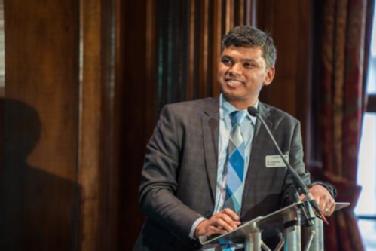 applied across automated transport modes.
applied across automated transport modes.
The new report is the result of Warwick’s extensive safety research which has undergone 12 months of evolution, development and validation with key stakeholders across the transport domains of land, sea and air.
Over the past year, 35 organisations in industry, academia, government and regulation from the UK and internationally have contributed to the discussions which have been captured in the report. The report encourages Government policy to tackle similar challenges all three domains face to realise the safe introduction of automated transport systems, in a joined-up manner.
The Cross Domain Safety Report highlights the economic potential of the global automated transport ecosystem, which is projected to reach over £750 billion by 2035, with a UK market share of approximately 6% representing £42 billion and creating up to 38,000 new jobs.
When it comes to safety assurance of automated transport systems, the report suggests the need to not only establish the safety level of automated transport, but also to communicate the safety level to all stakeholders (society, regulators, policymakers, developers etc).
Communicating safety level is key as one of the main obstacles to the safe introduction and consumer acceptance of automated transport are safety and trust, according to this new research. The report contains a set of key recommendations which include standardised definitions, new processes for virtual test environments, a new scalable and manageable safety assurance framework, and the key role of independent organisations.
The report highlights that whilst there are differences between the safety assurance processes of autonomous ships, aircraft or vehicles there are also large elements of crossover. This can then be leveraged by governments, developers and manufacturers by aligning safety artifacts across the different types of transport, allowing for greater safety and consumer acceptance.
Ian Stewart MP, Chair of the Commons Transport Select Committee said: “It’s important that we look ahead and horizon scan at emerging technologies… We’ve got to look ahead to make sure the regulations are in place.
“It’s really interesting that this conference looked at these issues holistically because it’s very easy in the world of transport to look at each mode as if it existed in isolation, but there will be cross cutting issues”.
Professor Siddartha Khastgir, Head of Verification and Validation at WMG, University of Warwick, commented: “Safety of automated systems needs to be pre-competitive. At WMG, we are extremely grateful to all the contributors to the report who have come on this journey with us over the past 12 months.
"Capturing the collective intellectual output of the group, we have demonstrated in the report on cross domain safety assurance across land, air and marine, that there are a lot of synergies in the approaches across the transport domains. At the same time, there are certain aspects that will be very specific to the domains that should be tackled individually.”
The full report can be read here.
WMG and Conigital receive UK government funding for ambitious self-driving research project
WMG, at the University of Warwick, and Conigital, have been awarded a share of £81 million in joint UK government and industry support to develop self-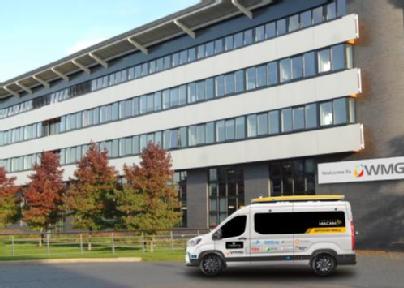 driving transport technology.
driving transport technology.
WMG is part of a consortium, led by Conigital, including the NEC Birmingham, Direct Line Group, Coventry City Council, Solihull Metropolitan Borough Council, Coventry University, dRisk, IPG Automotive and West Midlands Combined Authority.
The project entitled Multi-Area Connected Automated Mobility (MACAM) has been awarded a total of £16.6 million by the Centre for Connected and Autonomous Vehicles (CCAV), to establish a remote driving control hub, to oversee self-driving vehicles operating in Solihull and Coventry.
To make self-driving vehicle operations commercially viable, and offset current technology and driver costs, they must operate as efficiently as possible. This project therefore proposes a multi-area, multi-application self-driving operation, underpinned by Conigital’s 5G-based, central, Remote Monitoring Teleoperation (RMTO) system.
A mixed fleet of 13 self-driving vehicles will be moving passengers and light freight (such as mail and parcels for delivery) between Birmingham International Rail Station and Birmingham Business Park, and between Coventry railway station and Coventry University campus. These routes have a known, current, need for alternative transport and offer an ideal platform from which to develop commercial self-driving solutions.
New mobility technology and services will lead to safer, greener and more efficient transportation for both people and goods. MACAM will build on the foundations set by other projects including the WMG-led Midlands Future Mobility consortium.
Midlands Future Mobility is installing infrastructure on 200+ miles of West Midland’s roads to enable trials of Connected and Automated Mobility (CAM) solutions. This includes CCTV, weather stations, communications units, and highly accurate GPS coverage. The technology developed on the route will make UK roads safer and allow for more predictable goods delivery and journey times.
Transport Secretary Mark Harper said: “Self-driving vehicles including buses will positively transform people’s everyday lives – making it easier to get around, access vital services and improve regional connectivity.
“We’re supporting and investing in the safe rollout of this incredible technology to help maximise its full potential, while also creating skilled jobs and boosting growth in this important sector.”
WMG’s expertise on MACAM focuses specifically on the safety of the self-driving vehicles, as David Evans, Lead Engineer at WMG, University of Warwick explains: “Researchers and engineers at WMG will be providing trial support and undertaking related research in line with industry standards and best practice, required for the operator(s) to conduct the automated vehicle deployments safely and securely.”
Director of Intelligent Vehicles Research at WMG, University of Warwick, Professor Mehrdad Dianati, adds: “We have seen remarkable progress in Connected and Automated/Autonomous Mobility Technologies in recent years. It is paramount to pave the way for commercialising these technologies, particularly in the promising near future application areas such as the ones the MACAM consortium aims for. We are excited to be a part of this journey to transfer the knowledge we have developed through our fundamental research to help this unique consortium of UK companies, universities and local authorities to create new economic development opportunities for the region and the country.”
Don Dhaliwal, CEO of Conigital commented: “We are delighted to strengthen our links with WMG and other partners to accelerate a joint vision of Autonomous, Connected, Electric & Shared (ACES) fleets to address cities and businesses needs to Go Zero, Zero Accidents, Zero Emissions and Zero Congestion whilst creating new jobs via delivery of sustainable, accessible commercial CAM (Connected Autonomous Mobility) services.”
The methodologies and outcomes generated by the MACAM project will directly benefit teaching, research, and further collaboration with industry at WMG, developing future UK expertise and capability.
Read more about WMG’s Intelligent Vehicles research here and Conigital here
Read more about WMG’s MSc Smart, Connected and Autonomous Vehicles (SCAV) here.
Read more about the latest Centre for Connected and Autonomous Vehicles (CCAV) funded self-driving projects here.
ENDS
Notes to Editors
The government is awarding almost £42 million to seven projects through the Centre for Connected and Autonomous Vehicles (CCAV) Commercialising Connected and Automated Mobility (CAM) competition. Industry consortia will match the public grant to around £81 million and will be expected to demonstrate a sustainable commercial service by 2025.
The Multi-Area Connected Automated Mobility project is part of CCAV’s Commercialising CAM Deployments Competition (CCAMD).
The Commercialising CAM programme is funded by the Centre for Connected and Automated Vehicles, a joint unit between the Department for Transport and the Department for Business and Trade and delivered in partnership with Innovate UK and Zenzic.
The £40m CCAMD competition was launched in May 2022 to support the delivery of early commercialisable Connected and Automated Mobility Services and is part of the Government’s vision for self-driving vehicles. Connected and automated mobility 2025: realising the benefits of self-driving vehicles.
Multi-Area Connected Automated Mobility– Conigital
£8.3 million awarded by government, matched by industry to a total £15.2 million. This project looks to establish a self-driving vehicle operation around various parts of the West Midlands, underpinned by a centralised, Remote Monitoring Teleoperation (RMTO) centre. The RMTO centre will be where the project’s self-driving vehicles are monitored and (when required) controlled from, using 5G connectivity. The project aims to make self-driving vehicle operations commercially viable, and offset current technology and driver costs.
Celebrating British Science Week 2023
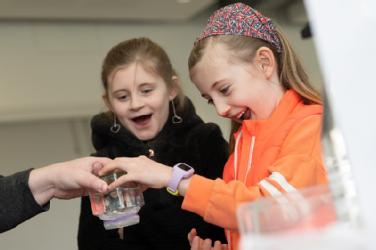 The WMG Outreach team had another busy, fun-packed British Science Week, taking part in a total of seven special STEM events reaching out to more than 2,200 young scientists, teachers, and families.
The WMG Outreach team had another busy, fun-packed British Science Week, taking part in a total of seven special STEM events reaching out to more than 2,200 young scientists, teachers, and families.
Two further events had also been planned for around 400 more students, but these had to be postponed due to the snow.
British Science Week is a ten-day celebration of science, technology, engineering and maths; and is a chance to look into the future and celebrate the impact scientific ideas can make on society. In support, the Outreach Team took part in the University of Warwick’s ‘Slice of Science;’ hosted science days at local schools, while WMG’s Jianhua Yang, Tudor Dodoiu, Iyabo Adamu and Marcelle Batson-Warner took part in Robot Day Coventry.
At Slice of Science, the University welcomed over 350 people. The Outreach Team ran an area called ‘Experience Engineering’ which featured science experiments, the opportunity to write code to control a digital embroidery machine, the navigation of robotic vehicles through a maze, an interactive puzzle showing the electronics inside a car, aerodynamics experiments and more.
WMG’s Director of Outreach and Widening Participation, Professor Margaret Low, explained: “These experiences allow students to see how their school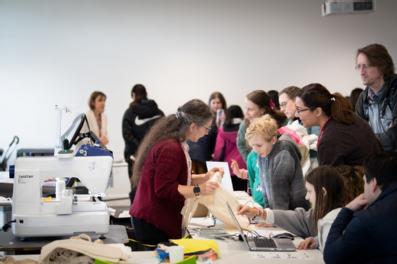 learning applies to complicated and world-changing technologies. Through our outreach programmes we hope to inspire young people to pursue careers in STEM, widen participation in Higher Education and make the STEM workforce more diverse.”
learning applies to complicated and world-changing technologies. Through our outreach programmes we hope to inspire young people to pursue careers in STEM, widen participation in Higher Education and make the STEM workforce more diverse.”
WMG’s Widening Participation Co-ordinator, Dr Phil Jemmett, added: “WMG and the High Value Manufacturing Catapult have outreach activities that are designed to give students a sense of ownership, since there are always elements they can re-create or try out at home. All the experiments we use in science shows or at public events are written up on our website under WMG Experiments, and we show the audience how it all works.
“It’s never magic – this is something anyone can do if they put their mind to it. We want to show people how exciting science and engineering can be, and that anyone can be an engineer.”
Find out more about WMG’s Outreach programme here: Public engagement and Outreach (warwick.ac.uk)
Mark Urbanowski, Principal Engineer, responds to the Government’s proposed cuts to active travel funding budgets
 Expert comment from Mark Urbanowski.
Expert comment from Mark Urbanowski.
Mark Urbanowski, Principal Engineer at WMG at the University of Warwick, said: “Travelling around the UK’s towns and cities is getting increasingly congested, polluted and unsafe. A key part of the solution to this problem, along with helping reach the UK’s Net Zero goal, is getting people and goods moved in efficient and clean vehicles, correctly sized for the journey, passenger and job requirements.
“Active travel, walking and cycling, as well as emerging micromobility transport options like e-bikes, e-cargo vehicles and e-scooters, need the right infrastructure to make them convenient and safe to use. Without investment for infrastructure and integration into the broader public transport system, modal shift to these vehicle types; by commuters, families and businesses; will languish behind the rest of Europe. It’s an issue we will be addressing at our Micromobility event in May.”
Expert comment from Professor David Greenwood
WMG is delighted at the news that Britishvolt have been purchased by Recharge.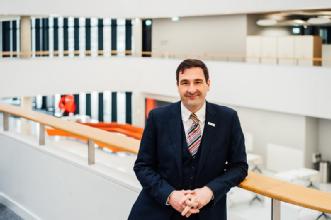
Professor David Greenwood, Director of Industrial Engagement at WMG, University of Warwick said: “This is great news for the UK, allowing us to capitalise on the value realised under the previous ownership. High value jobs will be protected and created in the UK as a result of this purchase - not just in the company, but in its upstream and downstream supply chains.
“For the UK to remain globally competitive, it is critical that we establish a strong battery manufacturing base to support many of our key industrial sectors, including automotive, aerospace, rail, marine and energy storage.”
WMG looks forward to continuing to support the growth of the UK battery industry.
Read more about the news here: https://www.bbc.co.uk/news/business-64754879
WMG in landmark battery development partnership
Researchers at WMG at the University of Warwick, are part of a unique four-way partnership, with Addionics, technology innovation catalyst CPI and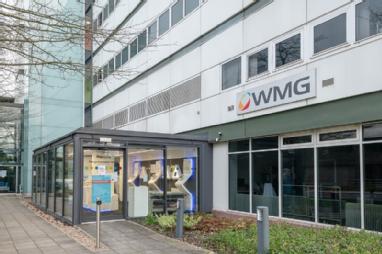 James Durrans Group, which will position the UK as a technology hub for global battery development.
James Durrans Group, which will position the UK as a technology hub for global battery development.
Project Constellation is an extension of Project STELLAR which focused on improving battery power and cycle life. Project Constellation takes the research to the next level addressing improvements to battery performance, which will in turn lower development and production costs.
The team at WMG will use its expertise in pilot scale electrode production, cell manufacturing and electrochemical testing to support and de-risk rapid technology screening and accelerate the route to market.
Farid Tariq Ph.D, CTO and Co-founder of Addionics, explains:" Constellation builds on the success of Stellar taking it beyond basic tests and towards industrially relevant scales. We are excited because it provides a strong integration piece of our technology with world leaders in coating and fabrication, and active material fabrication (WMG, CPI, James Durrans) that can show how our very smartly designed and structured current collectors can fit into a viable battery ecosystem and provide benefits from our technology. This is readily transferable knowledge and will push the creation of new methods to overcome modern limitations of batteries and fabrication."
Mark Copley, Chief Engineer in WMG at the University of Warwick’s Electrochemical Materials and Manufacturing team said: “WMG is delighted to be a partner in the CONSTELLATION consortium. Utilising our experience in scaling up new technologies, from lab to pilot line, we feel that we will be able to further the development of Addionics’ current collector technology whilst coupling in Durrans’ graphite and formulation developments, as derived by CPI.
“The project goals fit very well with the ideals of WMG, which is to work collaboratively with industry to deliver high-quality, applied, research and development. We look forward to the results that will be generated through this funded collaborative effort.
Project Constellation is a two year project, funded by the UK Government’s Faraday Institution’s Faraday Battery Challenge Round 5 Innovation.
About the partners
Addionics
Addionics is a next-generation battery technology company revolutionizing battery performance through its chemistry-agnostic Smart 3D Electrode architecture. The company’s scalable, cost-effective manufacturing process combined with its AI-based optimization software significantly improves the performance of any kind of chemistry, achieving batteries with higher energy density, faster charging, and longer lifetime, at low cost. With the mission to accelerate an electrified economy and decarbonized future, Addionics is unlocking the full potential and accelerating the electrification revolution through its drop-in solutions.
CPI
We take great ideas and inventions, and we make them a reality. Born in the North East of England in 2004, CPI is an independent deep tech innovation organisation and a founding member of the High Value Manufacturing Catapult.
We're a team of intelligent people using advances in science and technology to solve the biggest global challenges in healthcare and sustainability. Through our incredible people and innovation infrastructure, we collaborate with our partners in industry, academia, government, and the investment community to accelerate the development and commercialisation of innovative products.
Our work ranges from health technologies, advanced drug delivery systems, and medicines manufacturing innovations for multiple modalities including small molecules, biologics, and nucleic acids; to developing sustainable materials for energy storage and packaging, as well as novel food, feed, and nutraceuticals, that are all underpinned by digital technology. We turn the entrepreneurial spirit and radical thinking of our people and partners into incredible impact that makes our world a better place.
Let’s innovate together: uk-cpi.comLink opens in a new window
Connect with us: LinkedIn TwitterLink opens in a new window InstagramLink opens in a new window FacebookLink opens in a new window
James Durrans Group
Long established family owned manufacturing company (1863) based in Penistone near Sheffield but with manufacturing sites across the globe. We provide pro-active solutions to our customer needs. Experts in carbon processing and technology and the manufacture of heat resistant coatings and graphitic dispersions.
